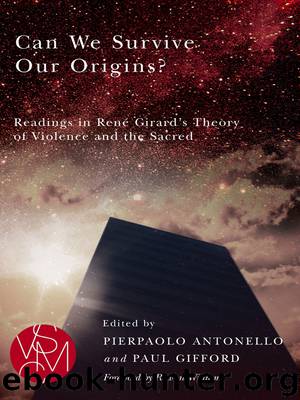Can We Survive Our Origins? (Studies in Violence, Mimesis, & Culture) by Unknown

Author:Unknown
Language: eng
Format: epub
Publisher: Michigan State University Press
Published: 2014-12-31T16:00:00+00:00
Survival “Opened Up” to Salvation: The Hebrew Scriptures
Gilgamesh shows us how, virtually from the beginning of our Western written record, the novelistic truth has been struggling to emerge from the romantic lie, how survival by myth and sacred violence has been opening to salvation by secular (i.e., post-religious) truth and succoring (i.e., “humanitarian”) love.
This emergence has come down several streams; here I mention only the two classic Western conduits, which flow from Athens and Jerusalem respectively. Greek medicine, mathematics, drama, and philosophy, and especially Greek tragedy, show clear traces of an emergence from the house of mythology, but do not often make the conscious connection between mythology and sacrificial religion that Girard shows us so insightfully (often using Greek texts). Jerusalem, on the other hand, sends out a stream of disclosure that exposes sacrifice, myth, and prohibition for what they are, the building blocks of the house that violence built .
Typically, Girard identifies in the Hebrew scriptures outbreaks of an especially intense mode of historical narrative that might be called epiphanies of Gospel truth. This phenomenon has long been recognized in traditional exegesis as “typology” or “figuration.” For Girard, the striking types or figures are the Joseph story (Gen. 30:24–50:26), the judgment of Solomon (1 Kings 3:16–28), the Suffering Servant of 2 Isaiah (40–52), and the story of Job (Williams 1991).
This last text, which is a protest against the cruel moralizing of the Jehovah of Hebrew tribal imagining, comes from the Wisdom tradition and claims that God is not the moral tyrant presented in the Deuteronomic histories. It may provide us here with a useful tuning fork for apprehending the Girardian reading of the Hebrew scriptures as a whole.
God, as shown here, paradigmatically, and for the first time, is seen to prefer a man who speaks the truth to one who blames the sufferer for his sufferings in order to safeguard the moral reputation of God . The truth of Job is that the high and invisible God, unlike the tribal deity often mistaken for Him . . . is not vengeful.
The modern reader, particularly if programmed by Enlightenment thinkers, or by modern Absurdists, is likely to respond: “But the philosophic price paid for this insight is high. His God might not be vengeful, but does He then not appear as unreliable, unpredictable, obscurely cruel in his failure to intervene savingly? God has allowed Job, on a whim, to be “tested”—for which metaphysical enigma, this text, markedly, does not even attempt to offer any explanation. Perhaps the moralizing of the Deuteronomist is preferable?”
Girard, however, applies here the deconstructivist thrust of his own theory of the archaic sacred. The x-ray shape he discerns beneath the fabulating and still mythic data of the story is that of Job, “Victim of his people .” In other words, the God Job wrestles with is not just that of a peculiar Hebrew tradition of retributive justice; he is, in part still, the sacralized projection of the “God” of the archaic sacred (or “primitive religion”) as such , i.
Download
This site does not store any files on its server. We only index and link to content provided by other sites. Please contact the content providers to delete copyright contents if any and email us, we'll remove relevant links or contents immediately.
| Anthropology | Archaeology |
| Philosophy | Politics & Government |
| Social Sciences | Sociology |
| Women's Studies |
Born to Run: by Christopher McDougall(7120)
The Leavers by Lisa Ko(6945)
iGen by Jean M. Twenge(5408)
Sapiens by Yuval Noah Harari(5366)
Spare by Prince Harry The Duke of Sussex(5176)
The Kite Runner by Khaled Hosseini(5170)
Machine Learning at Scale with H2O by Gregory Keys | David Whiting(4292)
Bullshit Jobs by David Graeber(4179)
Never by Ken Follett(3937)
Goodbye Paradise(3799)
Livewired by David Eagleman(3764)
Fairy Tale by Stephen King(3370)
A Dictionary of Sociology by Unknown(3073)
Harry Potter 4 - Harry Potter and The Goblet of Fire by J.K.Rowling(3060)
The Social Psychology of Inequality by Unknown(3018)
The Club by A.L. Brooks(2919)
Will by Will Smith(2908)
0041152001443424520 .pdf by Unknown(2843)
People of the Earth: An Introduction to World Prehistory by Dr. Brian Fagan & Nadia Durrani(2727)
